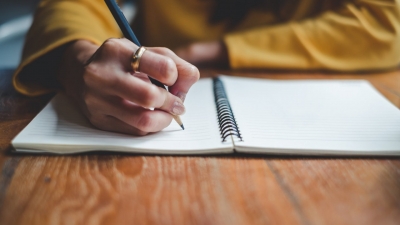
We all want to write – and write creatively. If you want your writing to shine, you should make sure it is original. It should read like it is fresh, not only in ideas, but also in the way you put them across. With your writing you should try to create a world of words. It doesn’t matter what you are writing – stories, letters, passages or simply answers to questions in a test, you need to make it readable and interesting. Some people say writing beautifully is a gift. Agreed, we cannot all write like our favourite authors (though we wish we could), but we can definitely enhance the beauty of what we write by following a few simple tips.
Add freshness to your writing
Our simple way to add freshness to your writing is to avoid repetition of words and phrases. When you want to write creatively, you need to look for new ways to clothe your ideas in. The best and the easiest access to this are the dictionaries and the thesaurus. Let’s look at some verbs we tend to repeat and find alternatives for them.
Said
Dialogues often form the most important parts of a story. We typically start dialogues/direct speech with the default “said.” I suspect that readers just skim over this overused word and move on to what is being said. But you can give the speech more strength and draw more attention to what is being said by substituting “said” with more meaningful words. For example:
He said, “I have to leave now.” She said, “No, you cannot go. The meeting is not over.” He said, “I have to, I will be late for the flight.” She said, “But this is important.”
Walked
“Walked” is another overused, common word. It adds nothing to creativity in writing, and readers will not bother to visualize the action you are describing. So why not “ambled, strolled, moved, shuffled, pushed, trudged , manoeuvred? Remember, the word “moved” when used often, can confuse the readers since it also means a mental state. “I was moved to tears by the performance.”
Paragraph 1: He walked through the crowd. He walked across the street slowly, trying not to push those around him. He walked, looking at the shops and walked on as if he did not have a care in the world.
Paragraph 2: He trudged through the crowd. He shuffled across the street slowly, trying not to push those around him. He ambled on, looking at the shops and moved as if he did not have a care in the world.
See how paragraph II tells you more about the state of the person when you use synonyms for “walked”?
Amazing
Oh, this is another word used for anything everywhere! Do you want to fill all your descriptive blanks with this one word? Plus, can a pizza, the unexpected ending of a story, a work of art, a monument, a guard’s bravery when confronting a thief – all be amazing on the same scale? The word loses its punch and gets your readers to yawn. Reach for the thesaurus now. What words can you choose to substitute “amazing” with?
Very
The adverb of degree “very” is now very flat. Adding it to show degree looks like lazy writing. Very disturbing, very normal, very beautiful, very annoying – very boring! Using it so much will not help to make your writing unique.
Try these instead, greatly, terribly, absolutely (another overused word), remarkably, notably, eminently, honestly, neatly.
But when it comes to adverbs, I prefer to use them to the minimum. It is better to allow the narrative speak for itself, without help from adverbs.
Nice
My English teacher would always circle the word “nice” in our answers and reduce marks for poor writing.
“Everything cannot be labeled as “nice”, she taught us. “Find appropriate synonyms!”
We did. A whole lot of them like pleasant, pleasing, satisfying, acceptable, delightful, enjoyable, pleasurable, congenial, fine, delicate, precise, meaningful. When we used these other words our descriptions were precise, accurate, and gave the reader a better sense of the object/idea we were describing.
Look
This is an overused basic verb. Happily, there are so many synonyms and substitutes for this word that you will always find one that is appropriate to the action you are describing. Find one that is exciting! Here is a list: glance, notice, peer, stare, study, watch, view, note, and glimpse.
Picture Credit : Google

